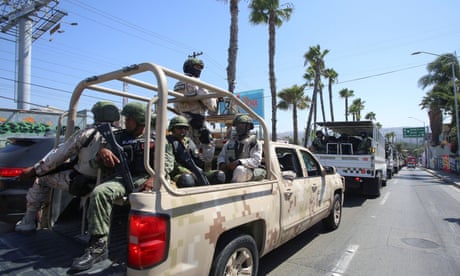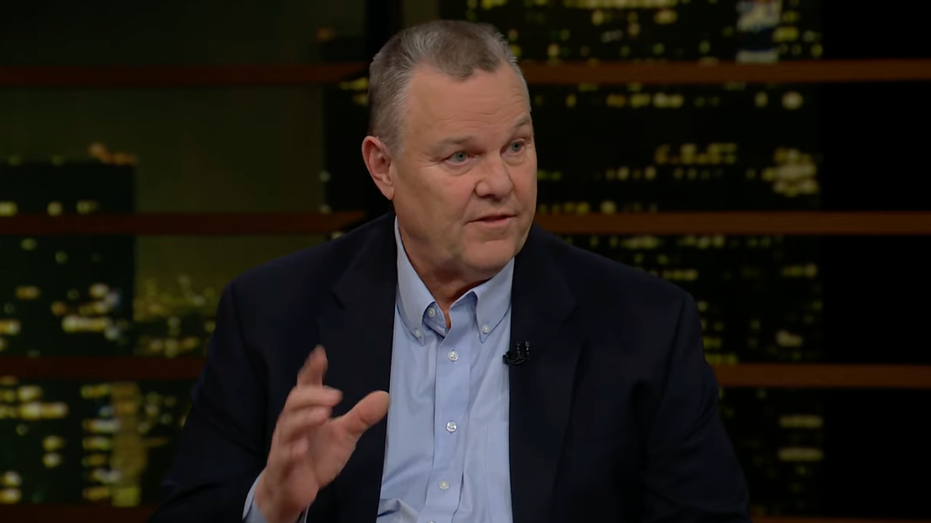- by foxnews
- 09 Mar 2025
Mexico’s citizens caught in crossfire as cartels launch attacks across the country
Mexico’s citizens caught in crossfire as cartels launch attacks across the country
- by theguardian
- 19 Aug 2022
- in news

For Carlos Holguin it was supposed to be just another day of toil.
Holguin was collecting a pizza when something hot pierced his left foot. Seconds later he saw people running for their lives. Still unsure what was happening, the delivery driver - who has a hearing impairment - threw himself to the ground as two more bullets struck his legs.
"Unfortunately, we live in a city and a country under assault from organised crime," Holguin said - as Mexico came to terms with the latest explosion of bloodshed in its traumatic modern history.
The violence, seemingly unrelated to the havoc in Jalisco and Guanajuato, soon spilled beyond the prison's walls as cartel gunmen hit a series of civilian targets, including the Little Caesar's pizzeria where Holguin was picking up an order.
"Terror," one Mexican journalist tweeted alongside graphic security footage of the moment police entered the bullet-riddled restaurant to find the floor smeared with blood.
The next day, Tijuana, roughly 20 miles (32km) over the border from San Diego, found itself at the eye of the storm, with its usually bustling streets emptying as bandits erected roadblocks and burned dozens of vehicles.
"I want to tell the people of Mexico to remain calm," said the president, who is known as Amlo, accusing conservative political rivals of "magnifying" the turmoil.
Yet the scale of the violence needed no amplification and offered a terrifying reminder of the muscle of wealthy and heavily armed groups such as the Jalisco cartel and the government's inability to respond, even in major cities.
"They went to withdraw some money for the week and were walking out when Jovanni just shouted at her, 'Run!'" said the victim's mother, Candelaria Varo. "When she turned around she saw he was injured and within seconds he was dead," she added.
"Drug cartels are less and less drug cartels and increasingly criminal enterprises," Balderas said. "Rather than simply arresting criminal operators, these [police] operations need to be closing bank accounts, seizing property, confiscating buildings and weapons, above all high-caliber ones, that only the army is allowed to use."
Mexico's defense secretary, Luis Cresencio Sandoval, has defended his government's tactics, calling the attacks a counteroffensive against growing government pressure, including the deployment of hundreds of members of the national guard and a series of major operations and arrests. The defense chief claimed increasingly frail organised crime groups wanted to show strength, "when in reality these underworld structures are being gradually eroded".
Yet experts are unconvinced by such claims, with Balderas one of many to question the government's strategy. "An operation's success is being gauged by the number of people arrested when this is actually a very poor indicator," he said.
The 9 August attacks that sparked Mexico's recent week of violence came as authorities attempted to seize Ricardo Ruiz Velasco, a Jalisco cartel founder nicknamed Double R who is close to the group's notorious leader, Nemesio Oseguera Cervantes, El Mencho.
Balderas said such outcomes highlighted the lack of operational intelligence and political will when it came to fighting organized crime. Examples of success included the July arrest of the legendary drug boss Rafael Caro Quintero and the 2020 capture of the leader of the Santa Rosa de Lima cartel, El Marro.
Mexico's political opposition has called the August attacks acts of terrorism and alleged Amlo's government is losing control of the country.
However the violence is defined, the human consequences have proved devastating.
"My brother is a decent person who supports his family and two daughters," he said. "He didn't deserve this."
- by foxnews
- descember 09, 2016
'Speaker scum' on flights sparks debate among travelers: 'This is getting out of hand'
A traveler asked social media users to weigh in on flyers who play audio aloud on their devices and don't use headphones.
read more


